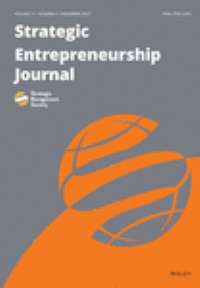Asserting and transcending ethnic homophily: How entrepreneurs develop social ties to access resources and opportunities in socially contested environments
IF 6.3
2区 管理学
Q1 BUSINESS
引用次数: 0
Abstract
In socially contested settings, it is often difficult to connect with (diverse) others, and it is unclear how entrepreneurs in these contexts may develop the social ties that previous research has shown to be valuable. We studied this subject matter in Kenya, an ethnically fractionalized society that recently experienced the decentralization of government, which required entrepreneurs to deal with both in-group and out-group ethnicities. We conducted an inductive case study of four Nairobi-based companies and captured the creative tactics that they used to transcend ethnic homophily (by defocusing from ethnicity and reframing the in-group) while also asserting ethnic homophily (by signaling tribal affiliation and leveraging others' ethnicity). We contribute to a deeper understanding of how and why entrepreneurs in socially contested settings develop social ties.坚持和超越种族同亲:企业家如何发展社会关系,在社会竞争环境中获取资源和机会
在社会竞争激烈的环境中,与(不同的)他人建立联系往往十分困难,目前还不清楚在这种情况下创业者如何才能建立起以往研究表明很有价值的社会联系。我们在肯尼亚研究了这一课题,肯尼亚是一个民族分裂的社会,最近经历了政府权力下放,这就要求企业家同时与本群体和外群体的民族打交道。我们对四家总部设在内罗毕的公司进行了归纳式案例研究,并捕捉到了这些公司为超越种族同质性(通过淡化种族和重构本群体),同时又坚持种族同质性(通过表明部落归属和利用他人的种族)而使用的创造性策略。我们的研究有助于加深人们对社会竞争环境中企业家如何以及为何发展社会联系的理解。
本文章由计算机程序翻译,如有差异,请以英文原文为准。
求助全文
约1分钟内获得全文
求助全文
来源期刊

Strategic Entrepreneurship Journal
Multiple-
CiteScore
11.10
自引率
1.60%
发文量
31
期刊介绍:
The Strategic Entrepreneurship Journal is a research journal that publishes original work recommended by a developmental, double-blind review process conducted by peer scholars. Strategic entrepreneurship involves innovation and subsequent changes which add value to society and which change societal life in ways which have significant, sustainable, and durable consequences. The SEJ is international in scope and acknowledges theory- and evidence-based research conducted and/or applied in all regions of the world. It is devoted to content and quality standards based on scientific method, relevant theory, tested or testable propositions, and appropriate data and evidence, all replicable by others, and all representing original contributions. The SEJ values contributions which lead to improved practice of managing organizations as they deal with the entrepreneurial process involving imagination, insight, invention, and innovation and the inevitable changes and transformations that result and benefit society.
 求助内容:
求助内容: 应助结果提醒方式:
应助结果提醒方式:


